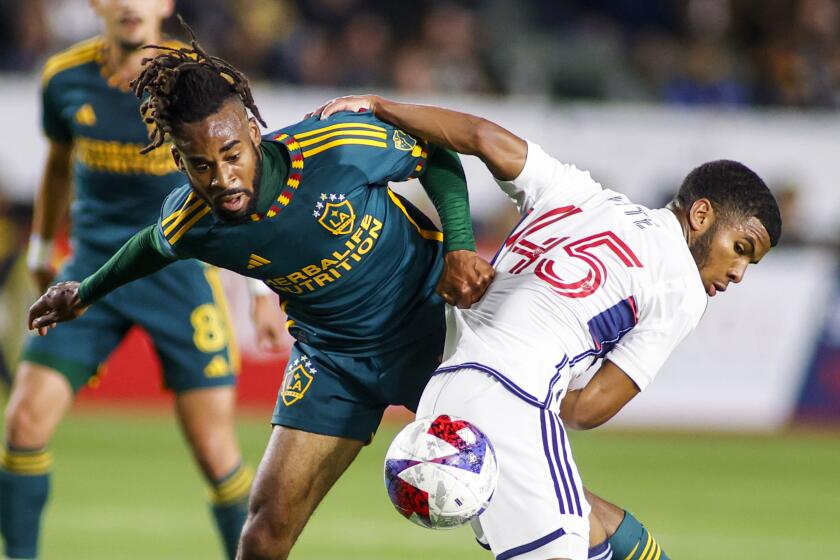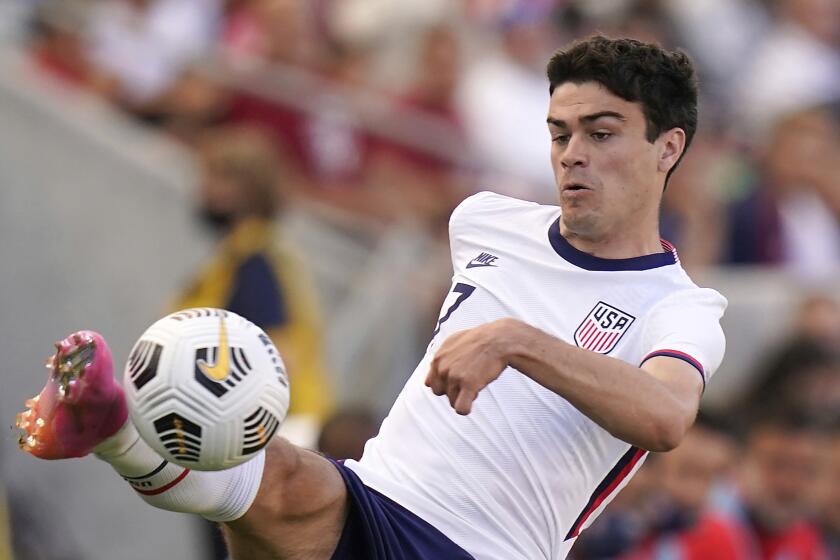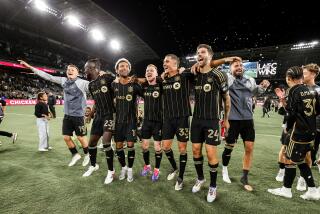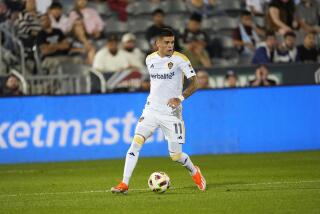Commentary: What’s wrong with the Galaxy? Fan base growing impatient with front office
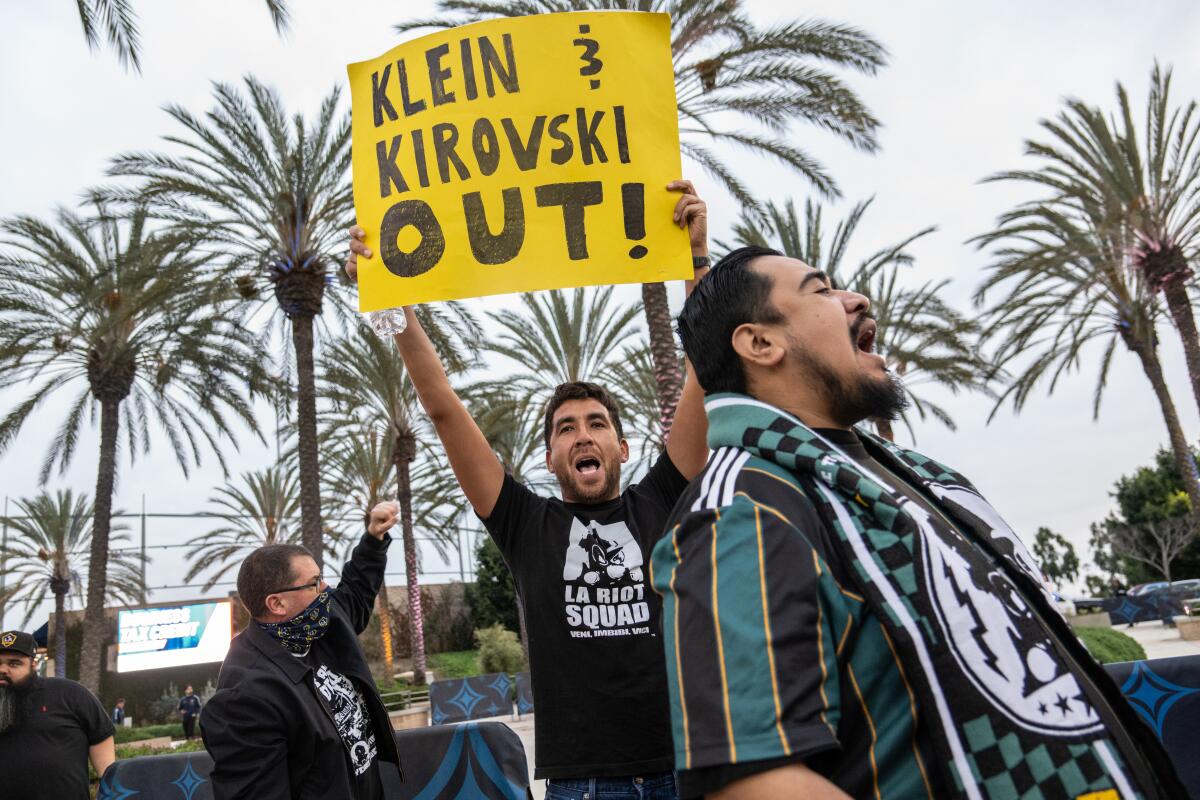
Alex Kozela has been a Galaxy fan since he was a boy, so for him the team’s home opener has always been a rite of spring, a source of hope and expectation.
Not anymore.
On Saturday, when the team returned to Dignity Health Sports Park for the first time in five months, Kozela battled his way through the afternoon traffic, found a parking space and walked up to the stadium entrance as usual. Only this time he didn’t go in. Instead, he stood with a group of supporters and season ticket holders outside the stadium’s main gates to protest the team’s direction.
“The club has lost sight of what’s really important to the supporters and the fans and the community,” Kozela said. “We’re here to support the team and give our money to the organization because we love this club. I’ve loved it since I was a kid.”
It’s a love, he said, that has become unrequited.
“There’s a disconnect,” he said. “The results on the field haven’t been good. But the results off the field haven’t either. What’s the vision? What’s the plan for the next five years? What’s the LA Galaxy’s identity?
“I’d love to know that from the top. Because we haven’t gotten that in a long, long time.”
After losing two goals to video review, the Galaxy settled for a 1-1 draw with the Vancouver Whitecaps that leaves them winless on the young season.
The fact the Galaxy have lost their way isn’t a secret. The team has lost more games than it has won over the last six seasons and hasn’t played for an MLS Cup since 2014. So when the club points to its record five league championships and nine appearances in the Cup final, it feels more like a history lesson than a contemporary experience.
Even Greg Vanney, who played on the team’s first trophy-winning team in 1998, acknowledged that when he returned as coach two years ago, saying he had been hired “to get this club back to where people expect it to be.”
That journey is proving to be longer and more arduous than expected.
Vanney, the fifth coach in seven seasons, has guided the Galaxy to consecutive winning seasons and a playoff berth since 2021, but Saturday’s 1-1 draw with Vancouver left the team winless in three games this season, its worst start in 13 years.
The Galaxy (0-1-2) will get better. Designated players Javier “Chicharito” Hernández, the team’s captain and leading scorer the last two seasons, and winger Douglas Costa missed the first three games to injury, while Brazilian right back Lucas Calegari, the replacement for two-time MLS all-star Julián Araujo, has yet to play a minute. At the same time, the reported deal for Argentine left back Julián Aude has not been finalized and center back Séga Coulibaly is attending to personal business in France.
“We’re going through our phase of a couple of big injuries along with some guys that we’re still trying to get into the doors and get integrated into the group,” Vanney said. “It’s a process of keep getting better every game and take points along the way.”
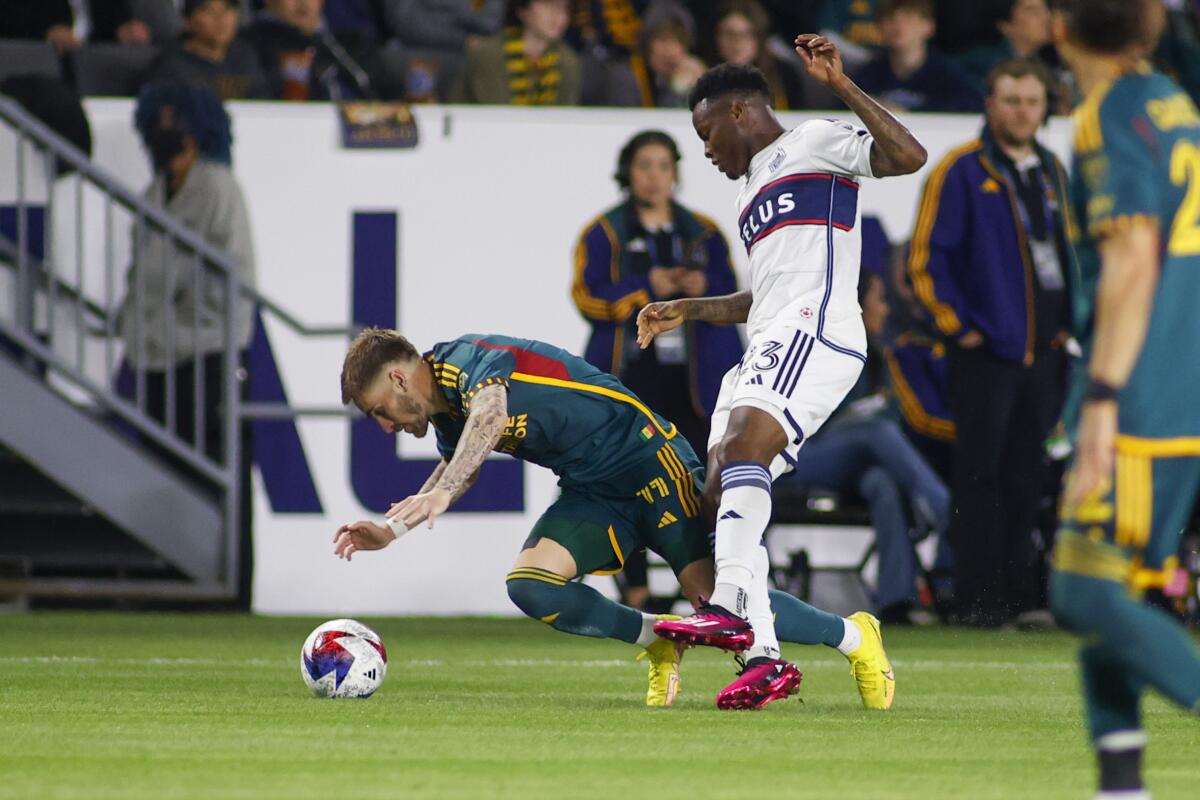
With nine of the 14 Western Conference teams qualifying for the playoffs, if the Galaxy simply can fog a mirror this fall, they should be in. And at full strength, the team is talented enough to make a long run once it gets there.
But the performance on the field is perhaps the simplest thing the Galaxy have to fix. Mending the club’s relationship with its most loyal fans might prove more difficult.
The team’s four main supporters groups said they are boycotting home games until the Galaxy make some changes in the front office, chief among them the dismissal of club president Chris Klein, who was signed to a multiyear contract extension this winter despite being suspended by Major League Soccer, punishment for the team’s violation of budget and roster guidelines during the 2019 season.
It’s far too early to gauge the boycott’s impact. According to a sergeant with the L.A. County Sheriff’s Department, Saturday’s protest drew just 250 to 300 people, while the attendance inside the stadium was announced at 23,112, fourth best in MLS last weekend.
That count, however, was based on tickets distributed and not an actual turnstile count, a number the team did not disclose. (The team also disputed law enforcement’s estimate of the number of protesters.) Either way, it was the smallest turnout for a Galaxy home opener since 2013 and the Victoria Block, the normally raucous supporters’ section in the north grandstand, was mostly empty — so much so that Cozmo, the Galaxy’s furry blue mascot, spent much of the game banging on advertising boards behind the end line to break up the quiet.
“Despite the boycott, the stadium really looked packed,” said Cary Hall, a longtime season ticket holder. “The crowd was enthusiastic, it seemed. What was missing was the chanting and the drums.”
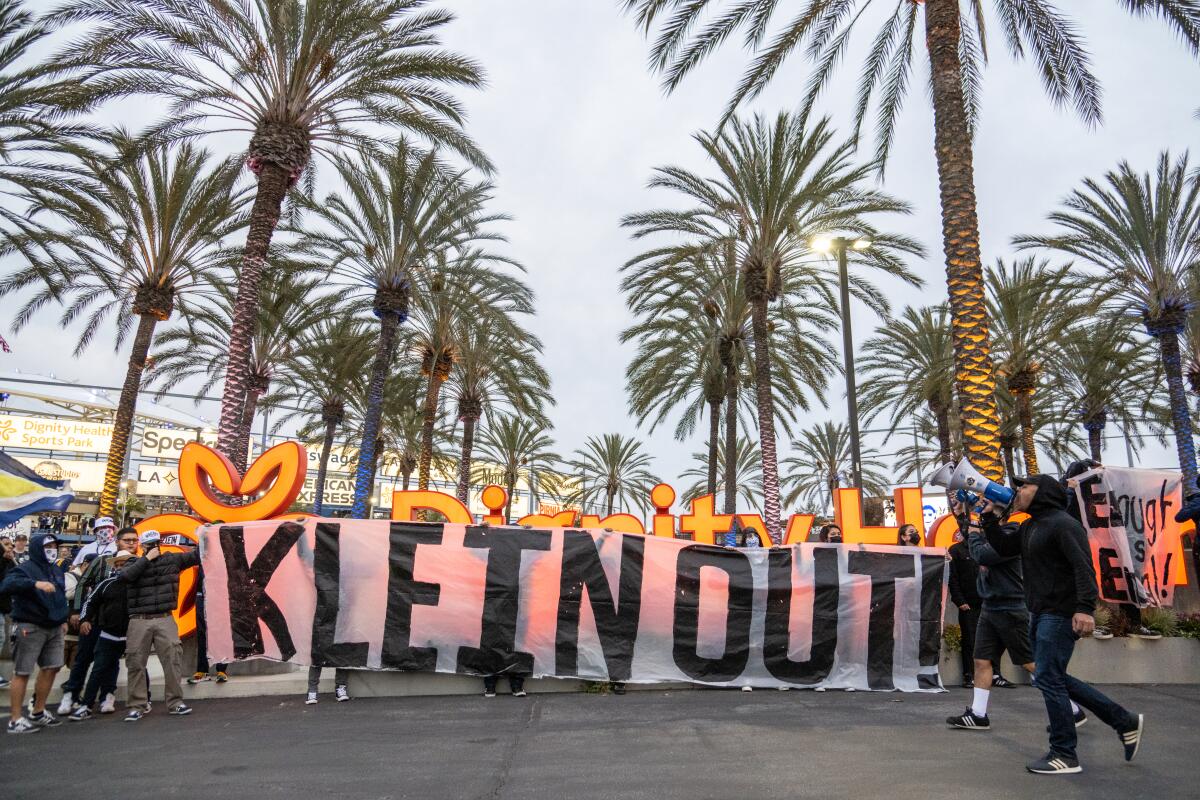
AEG, the Galaxy’s parent company, appears willing to wait out the boycott, aware that firing Klein would be unwise for a couple of reasons. First because it would be interpreted as bowing to supporters’ demands, and second because though Klein’s presidency has coincided with the franchise’s slide from perennial champions into mediocrity, he has been enormously successful on the business side, claiming to have broken franchise records for sponsorship and ticket revenue last season.
That’s not to say AEG isn’t concerned. The Galaxy have long prided themselves on being the league’s model franchise, but that mantle recently was passed to LAFC, the team’s neighborhood rival, which has won an MLS Cup and two Supporters’ Shields during a four-year span in which the Galaxy have won just two playoff games.
“I work in youth soccer, and literally every kid will tell you who’s the soccer team in L.A.,” Kozela said. “They’ll say LAFC.”
If the Galaxy can’t beat LAFC, they at least can copy the team, recently luring Will Kuntz, senior vice president of soccer operations and assistant general manager, away from LAFC. Kuntz, who is highly respected in MLS circles, said his role with the Galaxy remains a work in progress, though he could wind up serving as a firewall between the president and the soccer side of the team. That would allow Klein to continue growing revenue while relieving him of responsibility — or blame — for what happens on the field.
Gio Reyna was named to the latest U.S. Soccer roster despite controversy surrounding his parents’ meddling in response to his limited playing time.
LAFC’s front office, which has co-presidents, is set up in a similar way with Larry Freedman handling business operations and John Thorrington managing sports decisions.
Whether this proves to be another attempt at reshuffling the deck chairs on the Titanic or something that will repair the Galaxy’s shattered reputation remains to be seen. Either way, the resistance already seems to be cracking.
“They have a credibility problem,” John, a longtime fan who would only give his first name, said defiantly as he stood among supporters waving banners and chanting calls for Klein’s dismissal. “He needs to go. He’s the problem.”
But when the protest ended and banners were hauled away, John said he planned to take his regular seat inside the stadium and cheer the team on, just as he did in the good ol’ days.
⚽ You have read the latest installment of On Soccer with Kevin Baxter. The weekly soccer column will take you behind the scenes and shine a spotlight on unique stories. Look for it every Tuesday morning at latimes.com/soccer. Listen to Kevin Baxter on this week’s episode of the Corner of the Galaxy podcast.

